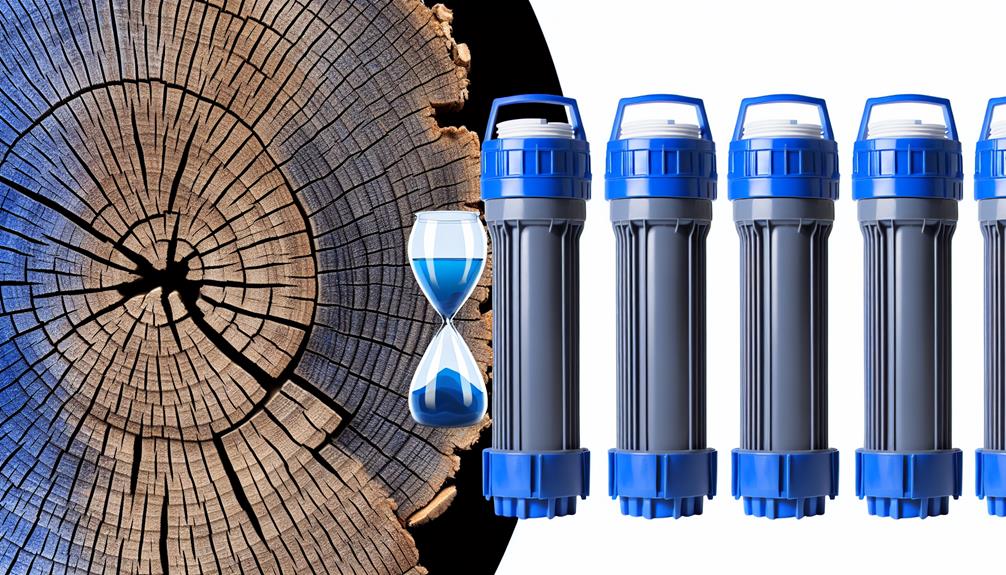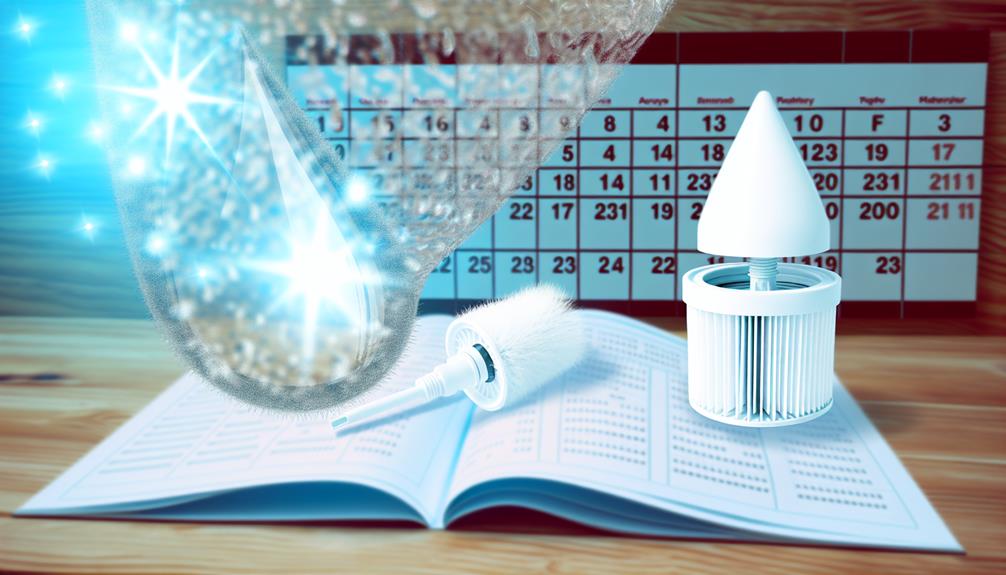As a guardian tirelessly standing watch over the purity of your water, your home filter demands a vigilant eye to retain its effectiveness. You've made the smart choice to invest in this essential household asset, and it's crucial you treat it with the care it deserves.
Understanding your specific filter type and its maintenance schedule is the cornerstone of ensuring it operates at peak performance. Cartridge replacements and routine cleanings aren't just recommended; they're vital to prevent contaminants from compromising your water quality.
But there's more to the story than just following a calendar of chores. Stick around, and you'll discover the nuanced steps that can extend your filter's life, maintain your water's crisp taste, and safeguard your family's health.
Understand Your Filter Type
Identifying your specific water filter type, such as an activated carbon, reverse osmosis, or ultraviolet sterilization system, is crucial for understanding its maintenance requirements and ensuring its optimal performance. Your water filtration system, whether it incorporates carbon filters or a more complex reverse osmosis setup, demands regular maintenance to function effectively.
If you're using an activated carbon system, you're likely familiar with the need to replace the cartridge periodically. The pores in carbon filters become clogged with contaminants over time, diminishing their efficacy. Manufacturers typically recommend a schedule for when a filter should be replaced, but this can vary based on your water usage and the quality of your water supply.
For those with reverse osmosis systems, maintenance is more intricate. It involves not only replacing filter cartridges but also checking the system's membrane and ensuring no leaks are present. The filtration process is highly effective, but without proper care, its performance can be compromised.
Lastly, ultraviolet sterilization systems require bulb changes at intervals suggested by the manufacturer to maintain their germicidal effectiveness. Understanding your filter type leads to informed decisions on maintenance, which is essential for prolonging the life of your water filtration system and guaranteeing safe, clean water.
Schedule Regular Maintenance
To maximize your water filter's lifespan, it's crucial to adhere to a maintenance schedule that includes regular filter replacements and thorough cleanings as per the manufacturer's guidelines. Proper maintenance is essential to ensure your filter system operates effectively. Set a calendar reminder to replace cartridges or filter media at intervals recommended by the manufacturer. This foresight is a form of preventative maintenance that will extend the lifespan of your filter.
For whole house systems, consistent water pressure is key to how well your systems work. Monitor this pressure and avoid fluctuations that might strain your filter. It's also advisable to refrain from using hot water, opting for warm water instead to maintain the integrity of your filter.
Monitor Filter Performance
Regularly monitoring your water filter's performance is essential to maintain its effectiveness and ensure clean, safe water in your home. Water filters need consistent oversight to operate at peak efficiency. You should keep a close eye on water pressure, as a noticeable drop can signal that it's time to change the filter. This is a clear indicator that the filter may be clogged with contaminants, restricting water flow.
Adhering to the recommended maintenance schedule for your type of filter is crucial. Each filter has a specific lifespan and, without fail, should be replaced according to the manufacturer's guidelines. This ensures that water quality isn't compromised. You'll also want to periodically inspect the filter body for any signs of buildup or impurities that could signify a decline in filter performance.
Stay vigilant for any changes in water taste, odor, or clarity, as these sensory cues often point to a filter that's no longer working effectively. To accurately monitor filter performance, consider investing in a water quality testing kit. This tool can provide you with concrete data regarding the filter's efficacy over time.
And remember, as your water usage fluctuates, so does the demand on your filter—keep this in mind when assessing when it's time for a replacement.
Implement Proper Cleaning Techniques
Ensuring the longevity and effectiveness of your home water filter begins with adhering to the manufacturer's recommended cleaning protocols. By consistently applying proper cleaning techniques, you not only extend the lifespan of the filter but also ensure that you always have access to clean water. Remember, maintenance is key to preventing the premature need to replace your water filter.
To help you keep your water filtration systems in top condition, here's a list of essential practices:
- Follow Manufacturer's Guidelines: Always consult your manual for specific cleaning instructions tailored to your model.
- Mild Cleaning Solutions: Utilize gentle, non-abrasive cleaners to avoid harming delicate components.
- Regular Component Cleaning: Keep parts such as the housing, screens, and O-rings free of debris for uninterrupted water flow.
- Seal Inspections: Check and clean the seals regularly to ensure they're secure and leak-free.
- Avoid Harsh Chemicals: Harsh chemicals and abrasive tools can degrade your system, so steer clear of them.
For systems like RO (reverse osmosis) or those with UV light sanitation, additional care, such as cleaning the quartz sleeve, is necessary.
Adapt to Water Quality Changes
Have you considered how changes in water quality might necessitate adjustments to your home water filter maintenance schedule?
Understanding and monitoring the quality of your water supply is crucial. Seasonal variations and local water treatment changes can significantly affect the water characteristics. It's wise to employ water testing kits regularly to detect any shifts in parameters such as hardness, mineral content, and contaminants.
If you're on well water, be especially vigilant as water quality can fluctuate more than with municipal sources. Hard water, rich in calcium and magnesium, can lead to scaling, which hampers water pressure and can clog your system. In such cases, a water softener may be necessary to protect the longevity of your filter.
Meanwhile, a spike in contaminants might require more frequent changes of your carbon filters to ensure they're effectively removing impurities.
For those utilizing reverse osmosis systems, be aware that any change in water quality can affect the RO membrane's efficiency. A drop in water pressure or an increase in sediment can necessitate a pre-filter change to prevent damage to the delicate RO membrane.
Always stay proactive and consult with water quality experts to tailor your maintenance routine to the current state of your water, thereby ensuring optimal performance of your filtration system.

